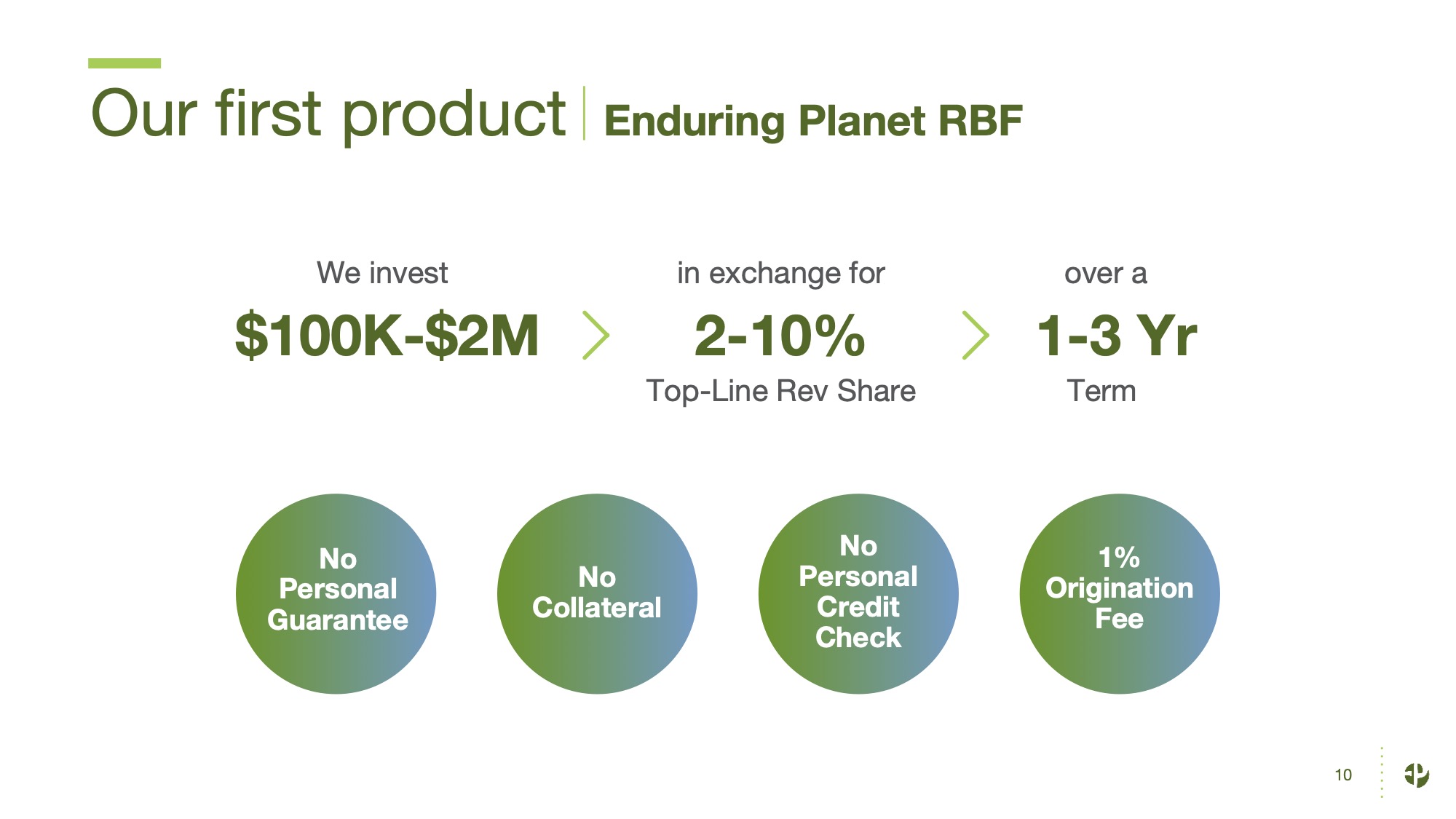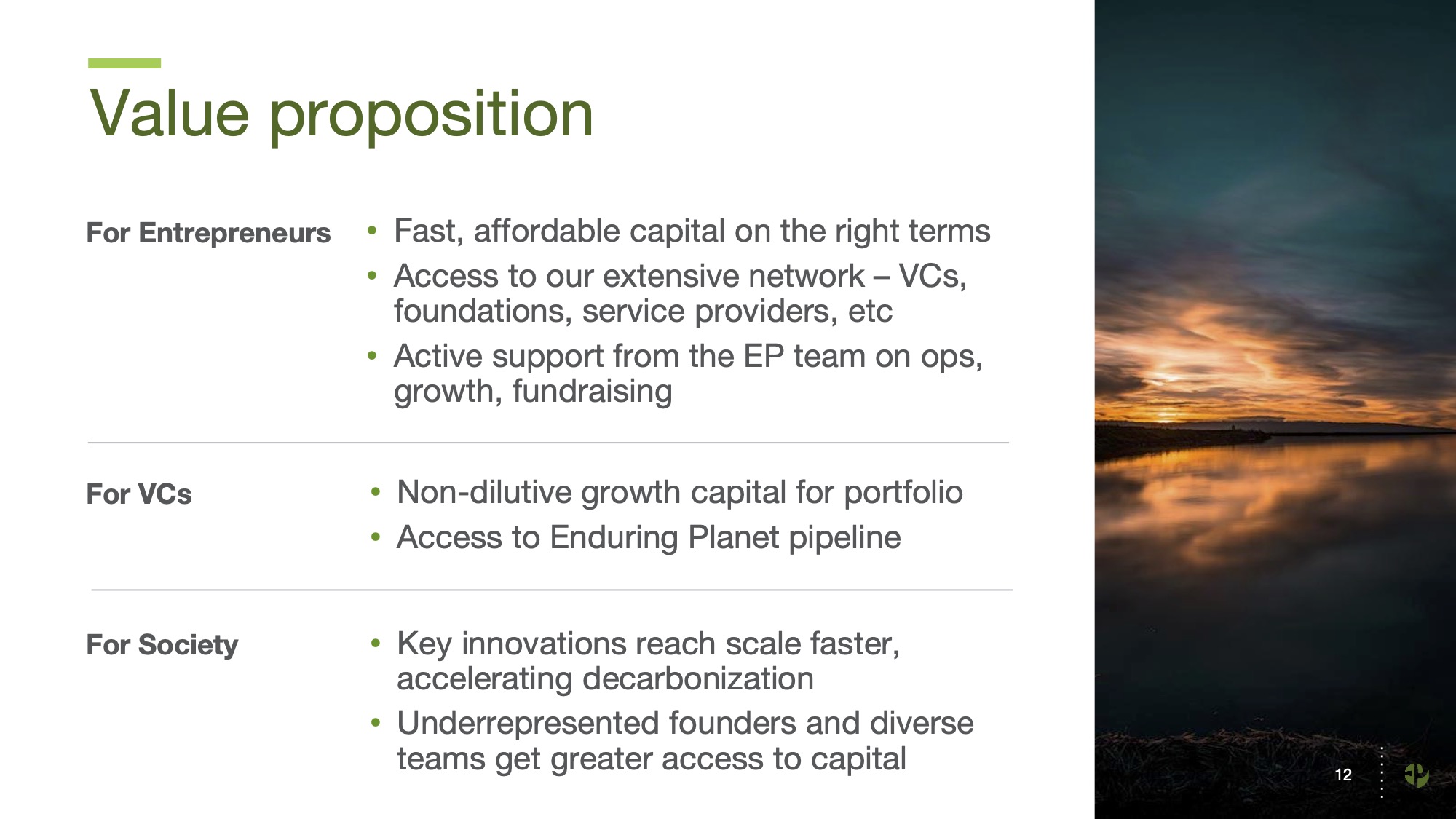We’re facing a pretty big climate change challenge, and I’ve long been skeptical about whether venture capital can be as big a part of the solution as it seems to think it is.
This is why I was so excited when Harri wrote about fintech startup Enduring Planet. It’s playing a really clever card: trying to make rapid financing available to climate entrepreneurs in a win4 situation — where investors, the startups, society and the environment all win.
A coherent story, with enough detail to understand what’s going on, without dropping into a rabbit hole. Put simply, I wish every deck did it this well.
Today, I’m delighted to present the deck the company used to raise its financing. As you might expect, it is a little bit inside baseball — this is a deck for a startup that helps other startups raise money from other VCs — but as you might also expect, Enduring Planet really knows what it is doing.
The deck is pretty extraordinary, and it’s fun to get under the skin of how the founders are thinking about its round. The company did an exemplary job on several slides that a lot of startups get wrong, and it even included some of the appendix slides, which helps deepen the story and context of the fundraise even further.
I’m psyched to share this with you — LFG!
We’re looking for more unique pitch decks to tear down, so if you want to submit your own, here’s how you can do that.
Slides in this deck
Enduring Planet’s slide deck does have some light redactions, but the main deck is more or less intact. The company removed the revenue numbers (but kept the graph) on Slide 16. It removed a deep dive into its underwriting criteria and removed company names from its pipeline slide. It also deleted a number of appendix slides (sensitive info about its underwriting, structures, etc.).
The main deck is an 18-slide deck, and the company included five of its appendix slides. That represents the first time I’ve been able to include appendix slides as part of a pitch deck teardown. I’m excited to dive in on the ins and outs of what appendix slides are for!
- Cover slide
- Team slide
- “Some investments to date” — Traction slide
- “Trend” — “Why now?” slide
- “Expanding investment by corporates and VCs” — Market evolution slide
- “Governments are turbocharging private sector action” — Global market opportunity slide
- Skyrocketing Startup + SMB Expansion” — Market trend slide
- Problem slide
- Solution slide
- Product slide
- “ML and Automation” — Product detail slide
- Value proposition slide
- Key investment criteria slide
- Pipeline slide
- Solution road map slide
- Financial projections slide (redacted)
- Team and board slide
- “Fundraising target” — Ask slide
- Appendices cover slide
- Appendix — Detailed problem slide
- Appendix — Sample VC partners slide
- Appendix — Key investment criteria: Sectors detail slide
- Appendix — Key investment criteria: Equity and inclusion detail slide
- Appendix — Risk management slide
Three things to love
There are some very serious issues with this deck, but I’ll get to those toward the end of this article. There’s also some absolutely excellent storytelling at play here, though — so let’s start there!
The deck pulls no punches
[Slide 8] The company’s problem slide is bold. Image Credits: Enduring Planet (opens in a new window)
I had to laugh when I saw Enduring Planet’s “problem” slide. It is out there raising money from venture capital firms, but it pulls no punches: It’s too little, too expensive, too exclusive and insufficient to hit the 2 degrees Celsius goal standard the Paris Agreement is aiming for.
The company outlines the problem succinctly and hints at its own solution in the last point — that institutional capital wants to deploy more money but doesn’t have an efficient mechanism for doing so. It’s one of the cleanest, simplest problem slides I’ve seen in a while; it outlines both an enormous problem and hints at the scale of the opportunity.
Solution and product slide working in tandem

[Slide 10] Product slide. Image Credits: Enduring Planet (opens in a new window)
I’ve long had a weakness for companies that are able to clearly articulate their stated solutions to a problem and their products as two different stories. There’s a good reason to do so.
Especially in the earliest-stage companies, you have a hypothesis that your product is a good solution to the problem, but you don’t know for sure. By divorcing the solution your company believes in from the product your company builds, you’re setting yourself up for success. You can always pivot exactly how you provide a solution — what you’re showing is an in-depth understanding of your market. Besides, you’re setting the scene for a story that includes more than one product to solve the full set of problems in the industry. That’s exactly what Enduring Planet is doing here.
On its solution slide (Slide 9), the company states that its solution is a “Climate-exclusive lending platform providing entrepreneur-friendly capital using the latest automation technology.” It sounds like a mission, but pay close attention: It is more tactical than a mission and works really well as the company’s solution statement.
From Slide 9, it moves into its product, and even explicitly states that this is its first product. There’s no whisper here: It loudly shouts that it has more ideas to serve as part of its platform.
If you’re in the process of fundraising, take an extra close look at slides 8 through 10 in this slide deck; Enduring Planet does a great job at presenting the problem/solution/product in a coherent story, with enough detail to understand what’s going on here, without dropping into a rabbit hole. Put simply, I wish every deck did it this well.
A win/win value prop
As I suggested in the intro paragraph, Enduring Planet does a particularly good job at painting a world where everyone wins.

[Slide 12] Value proposition slide. Image Credits: Enduring Planet (opens in a new window)
I often see value proposition slides in pitch decks; usually, they show the advantage for the customers. It’s encouraging to see Enduring Planet take a broader view into how it wants to show up in the world. In its appendix, it expands on how it shows up in society, spelling out how it envisions a world where everyone is pulling in the same direction.
Pay extra close attention to the “For VCs” part of this — as a would-be investor, I would. In two short bullet points, Enduring Planet is able to make two different points. “Non-dilutive growth capital for portfolio companies” is a powerful sentence; it means that Enduring Planet is promising VCs that its companies can go further without giving up more equity. Given that VCs typically are optimized to care about their ownership stake (and, by extension, are allergic to unnecessary dilution), that’s a powerful promise.
The second point is related but substantially different: By offering non-dilutive financing, Enduring Planet is likely to see a lot of deal flow and financial data for climate tech companies. That’s an information goldmine for VCs who are interested in investing in this space. When a company is ready to raise equity financing, some ways down the road after getting financing from Enduring Planet, the latter is in a fantastic position to be able to have a much deeper view into what startups are worth investing in and which are less attractive.
Bonus: Appendices

Image Credits: Enduring Planet (opens in a new window)
I quickly wanted to note the appendices that Enduring Planet used in its pitch deck; it’s worth taking a closer look at them in the full pitch deck below, but I love Slide 20, where the company expands on its claim that “Capital for climate entrepreneurs is either high cost or inaccessible.” It does that with a full matrix showing how equity, grants, commercial debt, venture debt and revenue-based financing are all poor ways to grow a startup in this space. It’s supremely elegantly done and efficiently positions Enduring Planet as a great financing option. An additional win — and something I wish was acknowledged more often — is that the company points out that “these challenges are greater for underrepresented founders across the climate-tech ecosystem.”
This is a great example of why you should consider having an appendix in the first place.
Putting a slide like this in the main deck would be a distraction; there’s 20 cells of detailed information, and if you care about this sort of thing, you could easily spend several hours picking it apart and rabbit-holing on the pros and cons of each funding option for various startups. Enduring Planet sidesteps that elegantly; if a VC wants to discuss this in more detail, they can quickly flick to the relevant slide and show that they’ve done the intellectual legwork to answer the question. And if it doesn’t come up as part of the pitch, great. The info is there for the investor to ingest after the call or in a later meeting, and you didn’t waste any time in the time-limited pitch. This is a great example of why you should consider having an appendix in the first place.
In the rest of this teardown, we’ll take a look at three things Enduring Planet could have improved or done differently, along with its full pitch deck!

